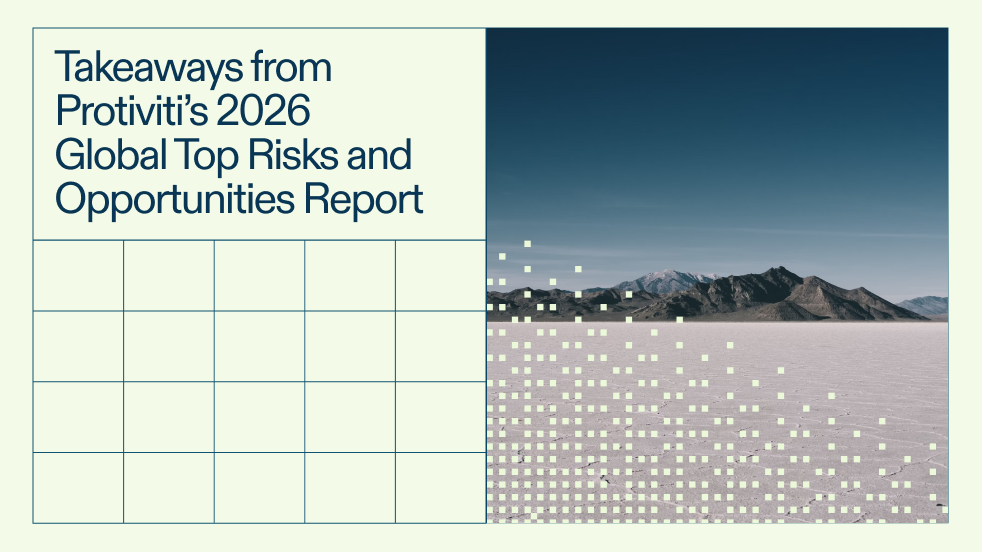
January 13, 2022 • 4 min read
Anthony Pugliese on Lifting the Profession to Meet New Challenges
In this edition of AuditTalk, Scott Arnold, president and CEO of AuditBoard, spoke with Anthony Pugliese, President and CEO of The Institute of Internal Auditors (IIA), to discuss how The IIA is working to elevate the profession to be ready for the challenges of a fast-moving environment like cyber risk, ESG, and more — because when internal auditors can do their work better, that work serves the greater public good. Hear why:
- Cyber risk is a natural growth area for internal audit.
- Helping create value around ESG is in internal audit’s DNA.
- Technology learning is a matter of survival, and how The IIA is using competency modeling to support upskilling at multiple levels.
Watch the full conversation, and read the can’t-miss highlights below.
Cyber Risk Is a Natural Growth Area for Internal Audit
Scott Arnold: “In the most recent OnRisk 2022 guide from The IIA, cyber risk has come out as one of the very top areas of concern for auditors and companies, and AuditBoard saw this as well in a recent survey that we published. What are your perspectives on that? How should auditors be thinking about the role that they can play in helping organizations manage cyber risk?”
“Anthony Pugliese: “If you think of the basics, our profession’s role is to help the board and management — the first and second lines in our Three Lines model — be prepared to understand risk, understand their role in mitigating risk, and help management with decisions and things that they need to be aware of. Cyber has become so dramatically important so quickly… There’s an almost three million person workforce gap in terms of people available and skilled to do cybersecurity. Given where we sit in organizations, I have to think we are uniquely qualified and situated to provide that service on what we are calling the key risk for the last two years.””
Why Helping Create Value Around ESG Is in IA’s DNA
Scott Arnold: “Well, if cyber is the top of the headlines today, right below it is the whole issue of ESG… I know you’ve spent some time up on Capitol Hill in discussions with the SEC, this is an area that could explode in the profession going forward. How do you think we can help prepare the profession to be ready to play a key role in ESG as well?”
“Anthony Pugliese: “ESG is another example like our opportunity with cyber. Anecdotally, I think the one question I get the most from members is why is ESG happening so fast, and I have to always remind them it’s not. It’s actually been happening over decades. It’s beginning to hit North America, specifically the US, a little bit quicker than it has in the past, but companies have been doing this since the ’90s, especially in Europe. I think what’s causing it to mature at a more accelerated pace is that the world’s changing. We are seeing climate change issues and a range of issues that are proving that those disclosures are important. We’re also seeing investors demanding it, and we’re seeing trillions of dollars in mutual funds being set up around companies that are practicing sound ESG policies. When you layer in data and technology, it really starts to make these things important.””
Technology Upskilling Is a Matter of Survival
Scott Arnold: “You know that technology is near and dear to our heart, so I’m wondering what role you think, in the midst of these transformations that are going on around cyber, ESG, skill transitions, what role do you think technology can help play in elevating the profession?”
“Anthony Pugliese: “I’m going to try to change the wording there, but it’s not just changing the profession — it’s requiring the profession to change. Everything is becoming more and more driven by IT, so actually — not to be dramatic — it’s a matter of our survival as a profession that we engage in technology learning and skilling.”
Elevating the Profession and Doing Good in the World
Scott Arnold: “I know it’s important to The IIA, and it’s obviously very important to AuditBoard as well, that we make those types of opportunities available to those who may not otherwise be able to afford them. In partnership with The IIA, AuditBoard has sponsored the Elevate Scholarship Program to provide access to CIA training for those who were either dislocated by the pandemic, or now with a merit-based award. That’s part of, I think, the heart of AuditBoard and The IIA to do good and help others. Anthony, are there any other elements of your strategic vision going forward that center around this idea of not just elevating the profession, but doing good in the world?”
“Anthony Pugliese: “We do a lot of good in the world. Like other professions can state, we are a benefit to the public interest. We do things that protect people and protect organizations where you may have investments or other things relevant to stakeholders. Our strategic plan, which is newly released in August of 2021, looks at six high-level goals that we want to use as our objectives to help members do better — and when our members do better, we believe that benefits the public interest at the highest level.””
Looking for more thought leadership? Check out our on-demand webinar library, and stay tuned for more AuditTalk videos featuring audit community leaders about industry issues, insights, and experiences.
You may also like to read


AuditBoard and IAF report: The more you know about AI-enabled fraud, the better equipped you are to fight it

Audit reporting best practices: Guide for audit leaders

Boards are struggling with AI oversight. How internal auditors can help

AuditBoard and IAF report: The more you know about AI-enabled fraud, the better equipped you are to fight it

Audit reporting best practices: Guide for audit leaders
Discover why industry leaders choose AuditBoard
SCHEDULE A DEMO



